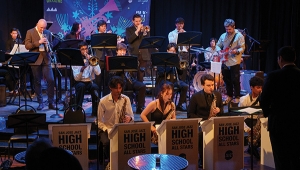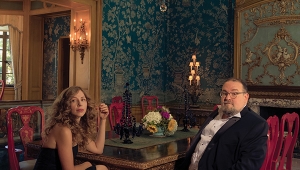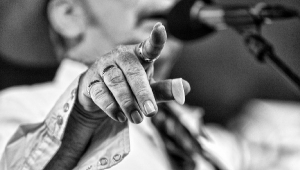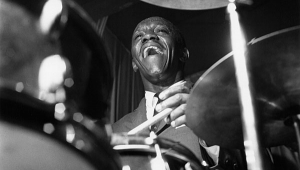| Columns Retired Columns & Blogs |
The Fifth Element #9 Page 3
Although I hesitate to recommend a book that is out of print, John Culshaw's Ring Resounding is worth tracking down or borrowing from the library. Culshaw produced the first complete studio recording of Wagner's Ring cycle, originally released on LPs. His unique memoir is a fascinating behind-the-scenes view of the early days of the synergy between LP recording and classical-music performance as international big business. [The Golden Ring, the Humphrey Burton-directed TV documentary on the making of the Culshaw-produced Ring, was released on DVD in mid-2002.—Ed.] Culshaw's life was tragically cut short by an unnecessary re-immunization: The batch of vaccine was bad, and he died of anthrax.
An engrossing history of the earliest years of acoustical recording is Jerrold Northrop Moore's Sound Revolutions: A Biography of Fred Gaisberg, Founding Father of Commercial Sound Recording. Not to be missed. And if you—like many people—have never experienced the surprisingly visceral impact of an acoustical phonograph, the best thing would be to locate a hospitable collector willing to give a demonstration. The next best thing is to get one of Nimbus' fastidiously produced Prima Voce CD remasterings, which are modern stereo recordings of acoustically recorded 78rpm discs being played back on a state-of-the-art phonograph from the 1920s. Two of my favorites are Amelita Galli-Curci (NIM 7806) and John McCormack (NIM 7868), either of which might lead you to reassess what is important in reproducing music. (Despite Nimbus' sad demise, I expect that copies are still floating around.)
Unless you just tuned in, you know by now that one of the first five recordings I reach for in order to evaluate a new component is Robert Shaw's Atlanta recording of Brahms' Ein deutsches Requiem. For placing the Requiem in its complete historical and social contexts, Jan Swafford's controversial Brahms: A Biography has my vote. It may be the best biography of a musician I have ever read. Most highly recommended.
One of the best books for putting Gustav Mahler in his wider cultural and social context, and just plain enjoyable to read as well, is Frederic Morton's engrossing and gossipy history of one year in Vienna, A Nervous Splendor: Vienna, 1888-1889. Just as Mahler realized that the classical symphony had reached an endpoint, one can argue that in Vienna in 1889, the European tradition of progressive liberalism intuited (without fully realizing) its failure and futility as a means of shaping a coherent, stable society. For most of the 20th century, the resulting gulf was filled by ethnic and class warfare and various flavors of totalitarianism. We are still grappling with the resulting mess.
Every time I see a news report from Bosnia, I can't help but recall that what started World War I was not the assassination of Archduke Franz Ferdinand, but Austria's demand that its forces could cross borders to apprehend the responsible Serb terrorists. That Franz Ferdinand was deemed worth trying to kill was an accident of fate. The man who had been closer in line to the Austro-Hungarian throne was his cousin, the progressive and widely admired Crown Prince Rudolph. Neither the first nor the last powerful man to throw it all away over a flighty young woman less than half his age (she was 16), Rudolph also hid a deep streak of melancholy. At the royal hunting lodge at Mayerling, where he and she had trysted, he shot her, then himself. (Memo to Monica: Count your blessings.)
There is no precise way to measure such impacts, but one could argue that the murder-suicide at Mayerling had more fundamental and far-reaching consequences for the world than the assassination of President Kennedy. Certainly the self-confidence of Europe's largest yet most diverse political unit was shattered, never to return. And that shattered—but determinedly in denial—milieu was the hothouse in which Gustav Mahler's art came into bloom.
Morton weaves art, culture, politics, and human drama into a compulsively readable whole—perhaps not the last word in scholarship or analysis, but more respectable than the tabloids at the supermarket checkout counter, and almost as much fun! And when you've finished A Nervous Splendor, you may have a deeper insight into Mahler's works than a musicological analysis alone could provide.
On the much lighter side, K.K. Beck's We Interrupt This Broadcast is a tongue-in-cheek murder mystery set in a dilapidated vinyl-only (!) classical AM radio station. Beck really must have done her homework—her odd assortment of grooming-challenged classical radio characters rings laugh-out-loudably true. My guess about the central plot motivation was wrong, but I bet you, too, will jump to the same conclusion. (Think of all those Shaded Dogs!)
Questions? Comments? Haikus? jmrcds@jmrcds.com.
- Log in or register to post comments



































